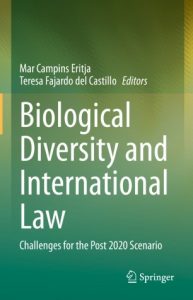
The book focuses on the interactions between international legal regimes related to biodiversity governance. It addresses the systemic challenges by analyzing the legal interactions between international biodiversity law and related international law applicable to economic activities, as well as issues related to the governance of biodiversity based on functional, normative, and geographic dimensions, in order to present a crosscutting, holistic approach. The global COVID-19 pandemic, the imminent revision of the Strategic Plan for Biodiversity 2011-2020, and the Aichi Targets have created the momentum to focus on the interactions between the Convention on Biological Diversity and other international environmental regimes.Firstly, it discusses the principles that inspire biodiversity-related conventional law, the soft law that conveys targets for enforcement of the Biodiversity Convention, their structural, regulatory and implementation gaps, the systemic relations arising from national interests, and the role of scientific advisory bodies in biodiversity-related agreements. The second part then addresses interactions in specific conventional frameworks, such as the law of multilateral trade and global public health, and the participation of communities in the management of genetic resources. Lastly, the third part illustrates these issues using four case studies focusing on the challenges for sustainability and marine biodiversity in small islands, the Arctic Ocean, the Caribbean Sea, and the Mediterranean Sea, as a way to strengthen a horizontal and joint approach.
The book is primarily intended for academics, researchers, and students interested in international environmental law and policy and in interactions for creating conditions for fair, sustainable, and resilient environmental development. By offering an analysis of instruments and criteria for systemic relations in those areas, it will also appeal to public and private actors at the domestic and international level.
Table of contents
Introduction (Mar Campins Eritja, Teresa Fajardo del Castillo)
Principles Inspiring Biodiversity-Related Conventional Law and Governance
Principles and Approaches in the Convention on Biological Diversity and Other Biodiversity-Related Conventions in the Post-2020 Scenario (Teresa Fajardo del Castillo)
Gaps in International Biodiversity Law and Possible Ways Forward (José Juste Ruiz)
Opportunities and Challenges for Synergies Across Biodiversity-Related Conventions in the Context of Human Health and Zoonotic Diseases: The Role of Scientific Advisory Bodies (Royal C. Gardner)
Biodiversity Interactions with Global Conventional Regimes
Conservation and Sustainable Use of Biodiversity in the International Regulation of Trade in Goods (Xavier Fernández-Pons)
Is Everything Marketable in International Trade? Public Health Issues in International Trade of Wildlife (Josep Maria de Dios Marcer)
Access to and Benefit-Sharing of Genetic Resources: Rationale, Review and Prospects (Xavier Pons Rafols)
Some Challenges for Sustainability and Marine Biodiversity
Sub-National Island Jurisdictions and Biodiversity Protection: Moving Towards Greater Resilience and Sustainability (Francesco Sindico)
The Arctic Ocean: Ecosystem Approach in a Context of Extreme Vulnerability (Mar Campins Eritja)
Governance of the Caribbean Marine Biodiversity: Complex Challenges for a Complex Region (Luis E. Rodríguez-Rivera)
The Convention on Biological Diversity and the Mediterranean Sea: A Beacon for International Environmental Governance in the Region? (Guillaume Futhazar)
